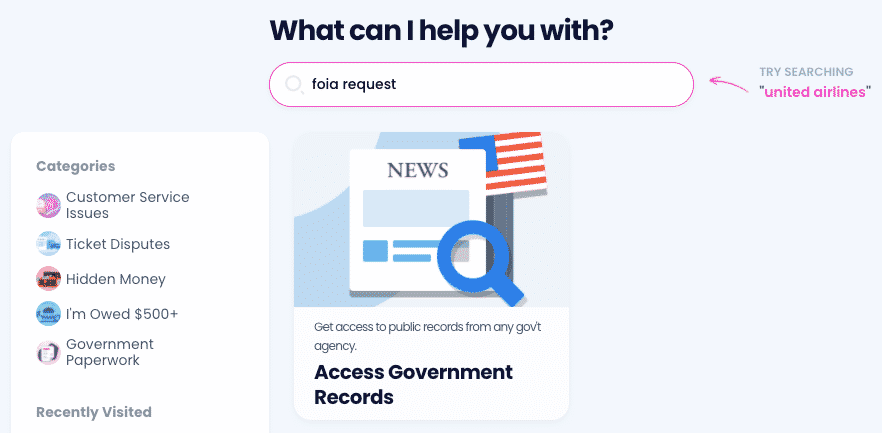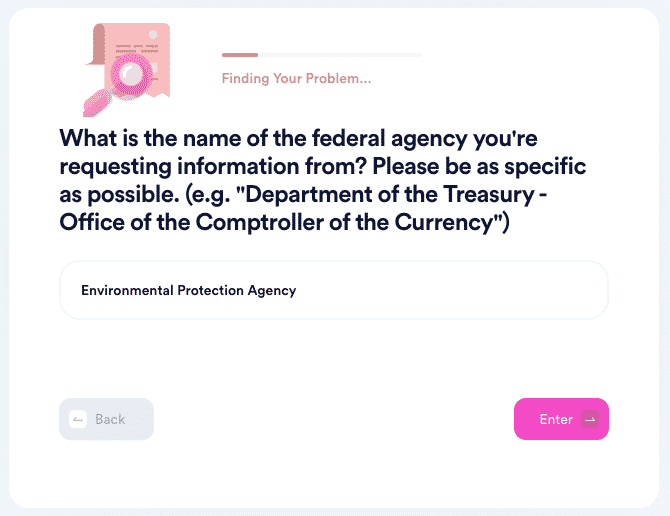A FOIA Appeal From A to Z
Although the Freedom of Information Act of 1966 is the epitome of transparency, democracy, and freedom of information, federal agencies can still deny FOIA requests.
We’ll answer any questions you may have about writing and submitting a FOIA appeal letter. This article will also give you insight into DoNotPay’s fast and efficient method of filing FOIA requests.
Can I File FOIA Appeals?
You can file a FOIA appeal if you’re not satisfied with an agency’s response to your request. You may submit an appeal if the agency:
- Withholds the requested records in part or fully
- Claims that you have not adequately described the records you want
- Doesn’t address all parts of your request
- Denies your request for expedited processing
- Miscalculates your FOIA fees or denies a fee waiver
- Doesn’t respond to your request within the provided time limits
What Are the Exemptions to the FOIA?
The main reason why a federal agency might reject your FOIA request is that the records you want may fall under FOIA exemptions.
The records that are not required to be released under FOIA are considered exemptions. They were established to safeguard against invasions of privacy and harm to investigations.
Here is an overview of the nine exemptions:
- Classified information protecting national security
- Internal agency rules and practices of its personnel
- Privileged information that can’t be disclosed due to another federal law
- Confidential commercial or financial information
- Privileged communication within or between agencies that have protection by the
- Attorney-client privilege
- Deliberative process privilege
- Attorney-work product privilege
- Personal information that would invade someone’s privacy
- Law enforcement information (e.g., that would interfere with enforcement proceedings)
- Confidential information regarding the supervision of financial institutions
- Certain geological information
What Should a FOIA Appeal Letter Include?
When an agency denies your FOIA request, you should receive a denial letter with a detailed explanation of the reasons for rejecting your request and the agency’s appeal procedures. This letter is crucial for composing your FOIA appeal letter.
Follow these guidelines, and you’ll write a promising appeal:
- State your full name
- Include your contact information
- Include all correspondence between you and the agency
- Attach copies of your original request letter and the denial letter
- Familiarize yourself with the FOIA exemptions in case you need to elaborate on them
- Explain why you believe the agency made a mistake denying your request and why you think it should reconsider its decision
- State when you expect the agency’s response (it should be 20 working days)
How Do I Submit My FOIA Appeal Letter?
Some federal agencies, such as the U.S. Customs and Border Protection (CBP), allow you to file an appeal through a FOIA online request form.
You may also send your appeal letter via:
- Fax
- Courier service
If an agency doesn’t state how you can file an appeal in its denial letter, it’s best to check before you submit it.
The FOIA Appeal Process Explained
When you receive a response or a denial letter from the agency in question, you typically have 90 days to file an appeal. Once you submit your appeal, the agency should accept or deny your appeal within 20 working days. If you receive no response or your appeal gets denied, you may file a federal lawsuit.
What Else Can I Do Besides File a FOIA Request Appeal?
Filing an appeal is not the only card you can play to get access to certain records.
Here are all the options you can resort to if an agency denies your FOIA request:
| What You Can Do | Brief Explanation |
|
Informal resolution | Contact the FOIA professional handling your request and try to resolve the dispute with them |
|
Declassification | Submit a request for mandatory declassification review of the information you request |
|
Mediation | Seek mediation services from the Office of Government Information Services at the National Archives and Records Administration |
|
Lawsuit | File a lawsuit in federal court so that the agency has to prove it’s not unlawfully withholding information or records |
DoNotPay Helps You Submit FOIA Requests
With so many rules and regulations to follow and familiarize yourself with, it can be overwhelming and time-consuming to file a FOIA request.
The next time you need access to government information, turn to DoNotPay! With a few questions from our chatbot, you will submit your FOIA request in no time.
Here’s how our FOIA feature works:
- Open DoNotPay in a
- Enter FOIA or Public Records in the search bar
- Type in the agency’s name and the info you need from it
- State whether you need a fee waiver or expedited processing

Based on the details you provide us with, our app will generate a request letter and send it to any agency on your behalf, including:
can also come in handy if you need to gain access to local or state public records.
If you need guidance with the FOIA requesting process, our articles about FOIA online requests and requests on yourself will help you out. You may also want to check out our FOIA request template and instructions regarding checking your FOIA status.

Admin Issues Giving You a Headache? Resolve Them With DoNotPay!
Scheduling a DMV appointment, applying for clinical trials, requesting refunds from companies, and getting in touch with your loved ones in prison are all difficult and time-consuming tasks. You have to take many steps before you can get any of these over with, and that’s why our AI Consumer Champion app is here to help.
No matter if you need assistance with appealing parking tickets, signing up for free trials, canceling various subscription services, or maybe preparing for government tests, DoNotPay will provide you with easy solutions.
Having Financial Struggles? Rely on the World’s First AI Consumer Champion
Many Americans struggle to make their ends meet at the end of each month. With that in mind, we’ve created plenty of features that will save you both time and money in the most efficient way.
Using our AI-driven app, you can get help with bills, get refunds from airlines, find unclaimed money in any state, or earn off annoying robocalls or stalkers and harassers. If you want to fight for your right, DoNotPay will also assist you in suing any person or company in small claims court.
No matter the admin task at hand, our AI Consumer Champion will provide swift and effective assistance.


